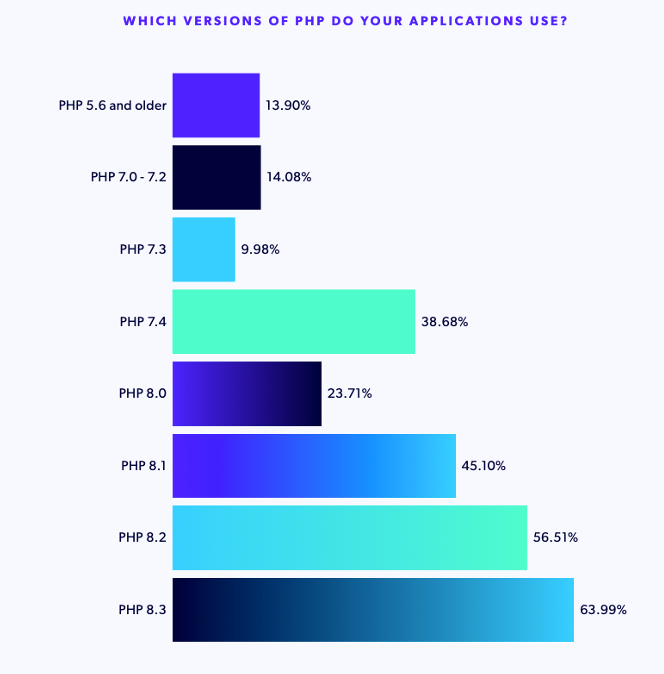Blog
June 16, 2025
PHP migration ensures your application has the most up-to-date features, security improvements, and performance benefits available. However, despite the advantages of upgrading PHP versions, many teams delay the process due to worry over disruptions, heavy resource demands, and other challenges.
In this blog, I examine the current landscape of PHP version adoption. I then explore ways organizations approached or are approaching migrations in 2025. Finally, I inspect pain points standing in the way of successful PHP migrations, providing insight and tips on how you can use this data to prepare your team for the coming months.
About the 2025 PHP Landscape Report
The 2025 PHP Landscape Report is based on a survey of 550+ self-identified PHP developers, administrators, and professionals. It details how teams are deploying, managing, and overseeing PHP-based applications in 2025. The report covers:
- Usage statistics and deployment trends
- Application security and compliance trends
- Observability and monitoring trends
- Containerization and orchestration technology usage
- PHP maintenance priorities
- And much more!
Our full findings are available as a free download. If you prefer to watch and hear our data, check out our on-demand webinar instead.
Back to topPHP Trends in 2025: Which PHP Versions Are Teams Deploying?
We began this segment of our survey by asking participants to share which PHP versions their applications use, with the option to select multiple versions as applicable.

On average, we found that teams were using 2.66 different PHP versions across applications. The most popular PHP version of the year was PHP 8.3 — the most current version at the time of the survey — at 63.99% of applications. This was followed by PHP 8.2 (56.51%), PHP 8.1 (45.10%), and PHP 7.4 (38.68%).
To better understand our gathered data and what it means for PHP teams in 2025, we then broke down PHP version adoption by major versions. We found that 71.18% of participants were deploying PHP 8.X versions. This was followed by PHP 7.X at 23.59%, and PHP 5.X or older at 5.23%.

Additionally, we saw a clear trend of teams using PHP versions currently supported by the community, with approximately 38% of participants deploying EOL PHP versions. This is a considerable drop of EOL PHP deployments compared to our 2024 findings, where over half of teams were using unsupported PHP versions.
The trend toward currently supported PHP versions continued when segmenting by container technology usage. 64.67% of teams using containers also used PHP still supported by the community.

Key Takeaways
The data reported in this survey reflect our observations of our own download trends at Zend. We’ve seen a significant decrease in LTS usage in the past six months, and as mirrored in the survey, PHP 8.3 has become the preferred version for users.

Some might attribute this to a change in the PHP lifecycle policy enacted in 2024: instead of two years of active support followed by one year of security-only support, each version now receives two years of active support and two years of security-only support. However, those changes happened too late to affect this year’s survey as it ran before the annual feature release.
Our suspicion is that many of the hurdles of jumping from PHP 7 to PHP 8 are handled in the libraries and frameworks PHP application developers consume, cushioning them from the impact of the upgrade. Within PHP 8 itself, the majority of deprecations and BC breaks since PHP 8.1 have limited impact on most applications, making it easier to adopt new releases.
That being said, nearly 38% of applications using EOL versions is still a large number — it’s more than one out of three. With the bulk of respondents on EOL versions using PHP 7.4, it’s clear that there are still hurdles when migrating to PHP 8 two years after 7.4 reached its end of life.
Back to topOn-Demand Webinar: Managing Mission-Critical Web Migrations
Watch along as Zend Senior Professional Services Engineer Clark Everetts dives into how to successfully manage mission-critical web app migrations.
Changing Trends in Completed PHP Migrations
After we established current trends around PHP version adoption, we asked questions surrounding PHP upgrade and migration plans. As with previous years, we began by asking teams if they had completed a PHP migration within the last 12 months.
76.29% of participants answered yes, they did complete a migration in the past 12 months.

Containerization Usage Significantly Impacts PHP Migration Habits
As shown below, this number rose significantly when looking at teams currently using container and/or orchestration technologies, with 83.89% of participants having completed a PHP migration. Only 68.51% of teams not using containers and orchestration technologies completed a PHP migration in the past 12 months.

Overall, teams were more likely to have completed a PHP migration compared to 2024, at 76.29% vs. 72.28%. We believe this speaks to the overall improvements in the language and ease of migrations to PHP 8.X versions compared to previous iterations.
PHP 7.4 Is No Longer a Leading Migration Destination
We then asked teams that had completed a PHP migration in the past year which PHP versions they migrated off of, and which PHP versions they migrated to — both with the option to select multiple versions as applicable.

The top PHP version participants migrated off of was PHP 7.4 at 51.08%. This was followed by PHP 8.1 at 29.16%, PHP 8.0 at 25.30%, PHP 5.6 or older at 24.58%, and PHP 8.2 at 20.48%.
Examining which PHP versions teams migrated to, we found that PHP 8.3 was the most popular destination. It was followed by PHP 8.2 at 47.71% and PHP 8.1 at 29.16%. Notably, and for the first time, PHP 8.0 outpaced PHP 7.4 as a migration destination at 14.70% vs. 11.81% respectively.
Key Takeaways
When on older PHP versions, a common pattern is to upgrade first to PHP 7.4, and then to a more recent and supported PHP 8.X version. The fact that PHP 7.4 was a destination for less than one out of eight respondents performing migrations, and that every PHP 8 version had higher adoption rates, tells us that PHP application developers are ready and eager to adopt the latest releases.
We were very surprised, however, to see that one out of four migrations came off PHP 5.6 or older, considering that PHP 5.6 reached its end of life nine years ago. Clearly, many respondents have been running PHP applications for quite some time!
We also want to point again the importance of containers in the PHP ecosystem: teams using containers were far more successful in completing migrations in the past 12 months. The ability to quickly test and validate applications against new versions clearly has an impact on success.
Back to topForecasting Upcoming PHP Migration Patterns
Once we established trends from the past year, we looked ahead, asking our respondents if they were planning a PHP version upgrade or migration within the next 12 months.

56.06% answered yes, they were planning a PHP upgrade or migration in the next year. An additional 6.06% answered that yes, they were planning a migration, but not within the next year. 34.85% had no upgrades planned at the time of the survey, and 3.03% planned to retire their PHP applications.
How Container Usage Influences Migration Plans
As container technology can significantly streamline a migration, we then examined migration plans segmented by container usage.

Teams using container technologies were more likely to have a migration planned in the next 12 months, with 68.42% of teams vs. 47.37% respectively. However, teams not using containers were slightly more likely to have an upgrade planned, just not within the next year (7.02% vs. 5.26%).
PHP Migration Plans for Teams Using PHP 8.1
Finally, as PHP 8.1 reaches end of life on December 31, 2025, we looked at migration and upgrade plans for teams currently deploying PHP 8.1. 60.42% had an upgrade planned in the next 12 months, with an additional 6.25% planning an upgrade, but not within the next year.

2025’s Biggest PHP Migration Pain Points
In our final migration and upgrade question, we asked participants about the most time-consuming components of their last PHP upgrade.

Of identified pain points, 38.21% identified Testing as the most time-consuming component of their last upgrade. This was followed by Refactoring (35.57%), before dropping steeply to Infrastructure Provisioning (9.15%), Planning (8.74%), Other (4.47%), and Compliance Renewals (3.86%). Repeated write-in answers included dependency management, unmaintained or un-updated libraries, debugging, and addressing deprecations between PHP versions.
Pain Points Vary By Organization Size
Next, we looked at PHP migration pain points segmented by company size. We found that smaller companies with 100 employees or fewer were more likely to identify Testing as the top pain point compared to their counterparts with over 100 employees. Larger organizations were far more likely to identify Refactoring as their biggest migration pain point at 45.39% of participants.

Key Takeaways
The best way to ensure success when performing a PHP migration is to have a robust test suite. Unfortunately, it’s often hard to identify migration pain points in test suites: is a new error due to application logic, or a backwards incompatible change introduced in the language? Worse, if it is due to a language change, is there a clear path to fixing the code to accommodate the change, or will you need to refactor substantially?
An interesting aspect when migrating to a new version is whether or not to take advantage of new language features. For instance, many of the new language features in PHP 8 allow developers to write more robust code — but doing so will often require substantial changes. As such, many organizations may choose to leave code as-is, to prevent introducing new issues.
With this in mind, we were a bit surprised to see Refactoring account for as much pain as it did, as this tells us that developers are willing to risk that trade-off due to the longer term benefits the refactor will provide.
Back to topFinal Thoughts
The 2025 PHP Landscape Report highlights how PHP teams are migrating and upgrading PHP versions at a faster rate than we’ve seen in previous years. This underscores the language’s improvements in usability and developer-focused features. However, challenges like testing and refactoring remain significant obstacles during PHP migrations, and teams still must carefully plan and strategize before beginning their migration process. Failure to do so can result in interrupted user experiences, expensive downtime, extended migration timelines, and a costly draw on available resources.
One solution for streamlining migrations is to partner with an experienced and trusted third party, like Zend. We offer a full suite of PHP services to support mission-critical apps, including Migration Services, Custom Consultations, and flexible Black Belt PHP Service Hours. Explore your options, and contact us today to learn more.
Make Our PHP Experts Your Experts
Zend Professional Services are ready to help you stay compliant and supported through comprehensive PHP migration and modernization support. Learn more via the buttons below.
Additional Resources
- On-Demand Webinar – Strategies for Modernizing Legacy Web Apps
- 101 Guide - PHP Versions
- Blog - Laravel Upgrades: Strategies and Approaches
- Blog - Modernizing Legacy Applications in PHP
- Blog - PHP 8.1 Upgrade Plans: How to Stay Ahead of EOL
- Blog – PHP Upgrades: How to Plan and Execute Your Next Upgrade
- Blog - PHP 8.5: New Features and Deprecations to Know
